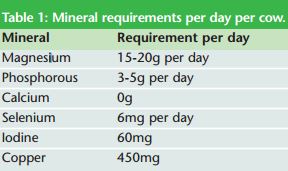



What Does My Dry Cow Need?
Good mineral nutrition during the dry period is a cost-effective way of reducing problems like milk fever, retained cleanings and slow calvings, advise Irish experts.This is according to specialist advice from the Agriculture and Food Development Authority (Teagasc) this January which outlines two types of minerals:
- Macro minerals, which are needed in large quantities (grams) per day, e.g., magnesium (Mg), sodium (Na), and phosphorus (P).
- Trace minerals, which are needed in tiny quantities (milligrams) per day, e.g., copper (Cu), iodine (I) and selenium (Se).
Mg is a key mineral for milk fever prevention – the recommendation is for 15-20g of supplementary Mg per day until after calving.
Check that your dry cow mineral is delivering this. High K silages (2.4 per cent) can interfere with Mg uptake.
Feed a low-K silage from two to three weeks pre calving if possible. Silage may be P deficient for dry cows on farms with a low soil P index, so there may be a need for 3-5g per day included in the dry cow mineral mix.
Trace minerals are important for good cow/calf health and immunity, so adequate cover for Se, Cu and I in particular is important.
Some farms opt for trace mineral boluses for dry cows but these will not deliver adequate Mg or P cover. These macro minerals must be supplemented, preferably as dusted minerals, even where boluses are used.



